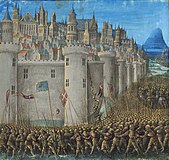
Back المسيحية والعنف Arabic مسیحیت و خشونت Persian Cristianismo e violência Portuguese Христианство и насилие Russian Християнство і війна Ukrainian 基督教和暴力 Chinese

| This article is of a series on |
| Criticism of religion |
|---|
| Part of a series on |
| Christianity |
|---|
 |
Christians have had diverse attitudes towards violence and nonviolence over time. Both currently and historically, there have been four attitudes towards violence and war and four resulting practices of them within Christianity: non-resistance, Christian pacifism, just war, and preventive war (Holy war, e.g., the Crusades).[1] In the Roman Empire, the early church adopted a nonviolent stance when it came to war because the imitation of Jesus's sacrificial life was preferable to it.[2] The concept of "Just War", the belief that limited uses of war were acceptable, originated in the writings of earlier non-Christian Roman and Greek thinkers such as Cicero and Plato.[3][4] Later, this theory was adopted by Christian thinkers such as St Augustine, who like other Christians, borrowed much of the just war concept from Roman law and the works of Roman writers like Cicero.[5][6][7] Even though "Just War" concept was widely accepted early on, warfare was not regarded as a virtuous activity and expressing concern for the salvation of those who killed enemies in battle, regardless of the cause for which they fought, was common.[8] Concepts such as "Holy war", whereby fighting itself might be considered a penitential and spiritually meritorious act, did not emerge before the 11th century.[8][9]
- ^ Clouse, Robert G. (1986). War Four Christian views. Winona Lake, Indiana: BMH Books. pp. 12–22.
- ^ Duffey, Michael (2015-06-22). "2. Christianity From Peacemaking to Violence to Home Again". In Omar, Irfan; Duffey, Michael (eds.). Peacemaking and the Challenge of Violence in World Religions. Wiley-Blackwell. pp. 55–56. ISBN 9781118953426.
- ^ "Religion & Ethics – Just War Theory -introduction". BBC. Retrieved 2010-03-16.
- ^ Syse, Henrik (2010). "The Platonic roots of just war doctrine: a reading of Plato's Republic". Diametros. 23: 104–123.
- ^ Duffey, Michael (2015-06-22). "2. Christianity From Peacemaking to Violence to Home Again". In Omar, Irfan; Duffey, Michael (eds.). Peacemaking and the Challenge of Violence in World Religions. Wiley-Blackwell. p. 58. ISBN 9781118953426.
The purpose of war for Augustine was to preserve "good order". It was a long lasting influence of St. Augustine's teaching on war and violence that shaped mainstream Christianity for 1500 years. Augustine fathered the mainstream Christian view that violence was just a means for political ends...Indeed, Augustine's perspective was not based on the New Testament.
- ^ Wells, Donald, ed. (1996). An Encyclopedia of War and Ethics. Greenwood Press. pp. 30–31. ISBN 9780313291166.
In 383, Christianity was declared the official religion of the Roman Empire, and Christians who had previously been aloof from political and social responsibility were compelled to rethink their role. Augustine, and his teacher St. Ambrose (340–397), in part inspired by the writings of Cicero (106-43 s.c.), developed just war criteria to show why Christians could consistently serve in the military as armed soldiers, at least in some wars. Although Augustine deplored the ambitions that promoted wars for sovereignty over others, he believed that there were conditions under which it was just to extend an empire... As instances of worthy causes Augustine named preservation of the well-being of the state, punishment of neighbor nations that had refused to make amends for wrongs committed by their subjects, to restore what had been taken unjustly, and even to expand an empire if one was taking land a way from a tyrant (Questions Concerning the Heputteuch. Question 10; and City of God. Book 4, Part 15).
- ^ Bonney, Richard (2011). "Just War". The Encyclopedia of War. doi:10.1002/9781444338232.wbeow328. ISBN 9781405190374.
Questions such as under which circumstances war may be legitimized, and the rules of war controlled, are the concern of just war theory in the Christian tradition from the writings of St. Augustine in the fourth century, through the scholastics of the Middle Ages (above all, St. Thomas Aquinas) and early modern period (Vitoria, Sua´rez, and Grotius) to modern commentators such as George Weigel and Michael Walzer. The early Christian writers in turn drew upon Roman Law and the writings of Cicero; indeed, in the view of Alex J. Bellamy, they "added little that was substantially new" (Bellamy 2006: 8).
{{cite book}}:|journal=ignored (help) - ^ a b Peters, Edward (1998). "Introduction". The First Crusade: The Chronicle of Fulcher of Chartres and Other Source Materials (2 ed.). Philadelphia, PA: University of Pennsylvania Press. ISBN 978-0812216561.
- ^ Duffey, Michael (2015-06-22). "2. Christianity From Peacemaking to Violence to Home Again". In Omar, Irfan; Duffey, Michael (eds.). Peacemaking and the Challenge of Violence in World Religions. Wiley-Blackwell. ISBN 9781118953426.
© MMXXIII Rich X Search. We shall prevail. All rights reserved. Rich X Search